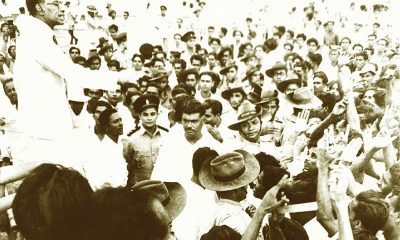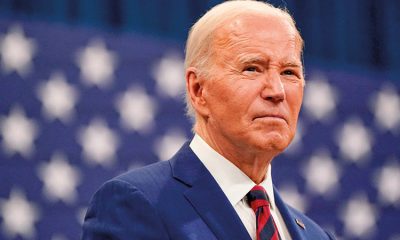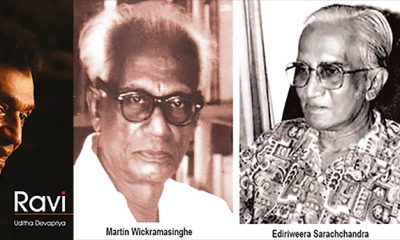Features
In Sri Lanka opposition parties remain as fragmented as ever
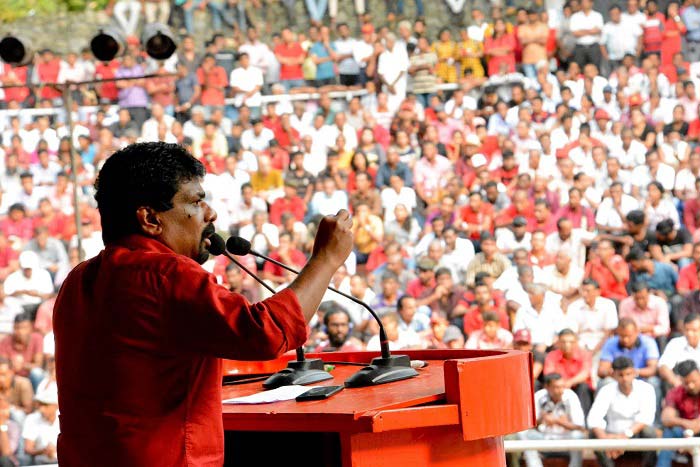
By Uditha Devapriya and Rumeth Jayasinghe
Like most South Asian countries, Sri Lanka will face elections this year. Both the government and the Opposition are busy preparing themselves for polls.Presidential elections are expected to take place in September or October 2024, though timelines have not been announced yet. Some analysts believe general elections will follow a presidential election, while others believe they will precede it.
The island nation, which faced its worst economic crisis in 2022, has managed to bring about some stability – though politically and economically, this stability remains fragile, if deceptive, certainly superficial.
The government, headed by Ranil Wickremesinghe, has seemingly managed to get things back in order. The country has imposed on itself several painful austerity measures, with assistance from the IMF, World Bank, and Asian Development Bank, in addition to support from other countries, including India.
Since 2022, Sri Lanka’s economy has seemingly fared well. The country managed to secure an agreement with the IMF on an Extended Fund Facility (EFF) programme in 2023. While the economy grew by 1.6 percent in the third quarter of 2023, inflation, which stood at 56 percent in December 2022, came down to 4.2 percent a year later.
However, while the situation has improved on some fronts, political uncertainty looms large over the island, as policy decisions have fuelled polarisation nearly everywhere. They have also ruptured conventional political divisions and patterns.
So far, Sri Lanka has made progress on restructuring bilateral debt of around USD 11 billion. It expects to come into an agreement with private creditors and bondholders, though the latter remain cautious if not wary.
One of Sri Lanka’s main pillars, tourism, has achieved much growth. Tourist arrivals surged from 194,495 in 2021 to 1,487,303 in 2023, partly due to an ambitious tourism promotional campaign which involved a prominent international influencer.
Once starved of tourists, the country is now witnessing an explosion in hotel bookings, well beyond existing capacity. Indeed, in a strange twist, the Department of Immigration and Emigration recently issued a notification requesting Russian and Ukrainian tourists to leave the island within 14 days, due to nationals of these countries setting up businesses at the expense of locals. A “White Only” party in the south organised in a Russian cafe had aggravated the situation. This is a far cry from 2021 and 2022, when the government was virtually begging for tourists.
However, while there have been improvements in these sectors, they are seen as benefiting a certain privileged class. The Opposition and sections of the public have opposed the government’s economic reforms, including the restructuring of the country’s State-Owned Enterprises (SOEs), which is expected to be completed shortly.
Tax reforms have also garnered criticism. Recent hikes in income and Value Added Taxes have imposed a huge burden on the country’s lower and middle-classes, including professionals and small and medium business owners.
Not surprisingly, these have polarised politics in Sri Lanka. They have been fuelled by the regime’s lurch towards authoritarianism. The recent Online Safety Act, for instance, has sparked criticism from civil society. Scandals, particularly one involving a former Health Minister, who has since been remanded, have taken centre stage.
All these have made the government more vulnerable. Yet far from bolstering unity within the Opposition, the Opposition remains as fragmented as ever.
The Main Opposition: Samagi Jana Balawegaya
The country’s main Opposition Samagi Jana Balavegaya, performed modestly at general elections in 2020, gaining 23.92 percent of the vote. Its leader, Sajith Premadasa, once an ally of Ranil Wickremesinghe, has become a fierce critic of his government.
Capitalising on widespread discontent, his party has vowed to reverse many of the policies being enforced by the government. Yet the SJB faces a tricky situation. On the one hand, as the main Opposition, it has organised numerous protests against the regime’s austerity measures and tax hikes. On the other hand, many of its MPs have aligned themselves with the economic ideology underpinning those reforms.
A recently unveiled economic policy document states that the party supports engagement with the IMF. This has led leftwing MPs to accuse the SJB of being no different to the government. The SJB, in turn, has accused these MPs of being “clueless” with regard to economic reforms, fuelling further divisions within the Opposition.
Complicating matters further, the party has invited to its fold several individuals who were associated with the Gotabaya Rajapaksa government. These include ex-military officials. The party itself is chaired by a former Army Commander, Sarath Fonseka. The inclusion of ex-SLPP stalwarts has driven a wedge between him and Sajith Premadasa, to a point where he is now touting himself as a presidential candidate in his own right.
Swinging to the Left: National People’s Power (NPP)
Widely seen as the most popular party in Sri Lanka, the National People’s Power is tipped to be a frontrunner at upcoming elections.
More than any other political outfit, it is the NPP that has tapped into public discontent with the government. It has based its campaign on promises of eradicating corruption. This, of course, was one of the themes of the protests that drove Gotabaya Rajapaksa out of power. It continues to resonate with the country’s youth, the peasantry, and the working classes, vast swathes of whom have swung to the Left.
Ideologically, the party is seen as favouring public ownership, State-led industrialisation, and nationalisation. It is fiercely opposed to ongoing reforms. Its stance on debt restructuring, though, remains less than clear. While it is opposed to the austerity that restructuring has imposed on the middle and lower classes, it has stated that upon coming to power it will renegotiate, not abandon, the IMF agreement. The IMF itself met with its MPs last January. Details of the meeting, however, have not been released.
The NPP is the parliamentary wing of the Janatha Vimukthi Peramuna, which was formed in the 1960s as an anti-establishment outfit, in opposition even to the mainstream Left. At the height of the country’s ethnic conflict in the 1980s, it was banned by the then government. This pushed it out of the democratic mainstream, leading to a protracted insurrection which was motivated, and driven, by Indian intervention in the country.
Since entering democratic politics in the 1990s, the JVP has softened its stances, though on several issues – especially the India-imposed 13th Amendment – it remains of the same opinion as before. It frequently denounces mainstream political parties, though it too was part of coalition politics. Yet it is seen by the country’s youth and lower middle-classes as being clean and free of corruption, a cut above the rest.
In that sense, the Indian government’s decision to invite the NPP to Delhi, where the party delegation met External Affairs Minister S. Jaishankar, affirms their growing importance not just at home, but also abroad.
Minority Politics: ITAK
The success of these parties will depend a lot on the alliances it forges with other parties. Though nationalism, particularly Sinhala Buddhist nationalism, has played a major part in elections in Sri Lanka, almost all parties have dallied with minority outfits. In 2019, for instance, the SLPP openly courted Muslim votes, even in the backdrop of the Easter attacks, while the UNP secured support from the country’s main Tamil party.
Since the 2020 general election, however, there has been a seismic shift in minority politics. This has been especially evident in Tamil politics. The biggest Tamil political party, the Ilankai Tamil Arasu Kachchi (ITAK), recently witnessed a change in its leadership, from a figure seen as a moderate to a more militant hardliner.
This prefigures a pivotal shift in the tactics of Tamil parties. Earlier, minority parties pursued negotiations with major parties with the objective of obtaining concessions on issues like devolution of power and, in the country’s Northern Province, the return of lands owned by the military to their previous owners.
The situation has changed dramatically today. At the last general election, ITAK retained its dominant position in the Northern Province. Yet two rival parties – the Tamil National People’s Front (TNPF), formed in 2010, and the Tamil People’s National Alliance (TPNA), formed in 2020 – secured enough seats to enter parliament. Both have gone beyond the ITAK’s politics of compromise, advocating for autonomy for Tamils.
S. Sridharan, the ITAK’s new leader, is a fitting symbol of these shifts. Described by the press as a “hardline apologist of the LTTE” – the separatist outfit that waged a war against the Sri Lankan government for 30 years – Sridharan has insisted on a new and more viable solution to the problems of his community.
One of the first things he did as party leader was to visit a cemetery for LTTE cadres in Jaffna. Since then, he has expressed reservations about the 13th Amendment and highlighted the need to go beyond devolution of power. Like his counterparts in other Tamil parties, he has pushed for a federal State. Crucially, he has stated he will do all he can to mobilise Tamil nationalist forces “as they were before 2009”, that is, before the LTTE’s military defeat at the hands of the Sri Lankan government.
So far, neither the government nor the Opposition – be it SJB or NPP – has responded to Sridharan’s calls. Yet alliances with minority parties have become a sine qua non of Sri Lankan politics. It is hence likely that government and Opposition will vie for minority votes through these parties closer to the election.
However, at a time when Sinhala dominated parties from both sides are mobilising nationalist sentiments against one another, it remains to be seen how far they will go to court minorities. While the President himself has made overtures to ITAK, convening a meeting, of Buddhist monks and members of the Tamil diaspora, Sridharan’s victory signals a rupture in minority politics in the island. In the long term, that will dampen prospects of a rapprochement between Tamil parties and the government.
The situation is the same with the Opposition. Both the SJB and NPP are courting disaffected voters from the SLPP camp. Some of these groups, such as ex-army officials, disagree heavily with the politics and ideologies of parties like the ITAK.
The Opposition faces a dilemma here. On the one hand, these groups can help erode the SLPP’s hold over nationalist votes. On the other hand, they can also erode the Opposition’s prospects within minority communities. While it is unlikely that minority parties will fully give up cohabiting with mainstream outfits, the SJB’s and NPP’s reaching out to ex-military types may cost both parties support from outfits like ITAK.
The Future: A (Very) Big Question Mark
Described as Asia’s oldest democracy, Sri Lanka faces a rather tricky crossroads this year. With rising tensions in the Indo-Pacific and the prospect of a forever war in the Middle-East, the island’s domestic politics will shape its foreign policy.
Of course, it is economics, not foreign policy, that has taken centre-stage for now. The big question on everyone’s lips is when Sri Lanka will begin to recover.
Such questions, however, cannot be answered or resolved easily.
Different parties have proposed and presented different solutions to Sri Lanka’s economic crisis. At the centre of it all is one issue. For how long can the country continue inflicting austerity on itself, and for how long can the government survive?
Colombo-based economists argue that IMF reforms should be continued and amplified. Yet the backlash those reforms have generated will be picked up by Opposition parties – even those which are fundamentally in agreement with them.
Thus, while the leader of the SJB has publicly stated that he will renegotiate Sri Lanka’s agreement with the IMF if he comes into power, party MPs have advocated for careful engagement with the IMF. Such contradictions are natural in a country where parties face different electorates and try to pander to all of them.
As for the government, it seems content in churning out narratives of stability. This is a line few people seem to be buying. While the situation has changed from what it was in 2022 – there are no miles-long queues for fuel and gas – that offers little consolation in light of the price and tax hikes which most people have had to put up with.
The situation has become so divisive, in fact, that a video of US Assistant Secretary of State for South and Central Asian Affairs Donald Lu describing Sri Lanka as a comeback story provoked outrage across social media, with several Sri Lankans questioning how he could remain indifferent to, and ignorant of, ground realities.
Against such a backdrop, it is difficult to say who will win elections and what the winner will do with the country. Certainly, the NPP has gained ground, while the SJB’s confused response to economic reforms has cost it popular support. Yet the NPP remains derided by mainstream parties, including the Opposition.
Critically, none of the three major parties battling for votes – SLPP, SJB, and NPP – has fully reached out to minority parties, in particular to Tamil parties.
The SLPP and SJB have, to be sure, forged alliances with certain groups. This is far from the case with the NPP. The NPP has so far been content in promoting its corruption-free record everywhere. The question is how effective such messaging will be with voters in the island’s North and East who have traditionally supported communal parties.
To be sure, it must be admitted that disaffection with the mainstream has grown so much that people are shifting to the Left, particularly to the NPP. To a considerable extent, this disaffection has cut across ethnic and religious divisions.
Whether that will translate into votes, of course, remains to be seen. But it has certainly boosted the NPP’s prospects. This has made it a clear frontrunner, in an election that is sure to be dominated by much uncertainty, chaos, and speculation.
Uditha Devapriya is a writer, researcher, and analyst based in Sri Lanka who contributes to a number of publications on topics such as history, art and culture, politics, and foreign policy. He can be reached at .
Rumeth Jayasinghe is an undergraduate at the University of Peradeniya who is pursuing economics. He can be reached at .
A version of this article was published in The Diplomat.
Features
Race hate and the need to re-visit the ‘Clash of Civilizations’

 Australian Prime Minister Anthony Albanese has done very well to speak-up against and outlaw race hate in the immediate aftermath of the recent cold-blooded gunning down of several civilians on Australia’s Bondi Beach. The perpetrators of the violence are believed to be ardent practitioners of religious and race hate and it is commendable that the Australian authorities have lost no time in clearly and unambiguously stating their opposition to the dastardly crimes in question.
Australian Prime Minister Anthony Albanese has done very well to speak-up against and outlaw race hate in the immediate aftermath of the recent cold-blooded gunning down of several civilians on Australia’s Bondi Beach. The perpetrators of the violence are believed to be ardent practitioners of religious and race hate and it is commendable that the Australian authorities have lost no time in clearly and unambiguously stating their opposition to the dastardly crimes in question.
The Australian Prime Minister is on record as stating in this connection: ‘ New laws will target those who spread hate, division and radicalization. The Home Affairs Minister will also be given new powers to cancel or refuse visas for those who spread hate and a new taskforce will be set up to ensure the education system prevents, tackles and properly responds to antisemitism.’
It is this promptness and single-mindedness to defeat race hate and other forms identity-based animosities that are expected of democratic governments in particular world wide. For example, is Sri Lanka’s NPP government willing to follow the Australian example? To put the record straight, no past governments of Sri Lanka initiated concrete measures to stamp out the evil of race hate as well but the present Sri Lankan government which has pledged to end ethnic animosities needs to think and act vastly differently. Democratic and progressive opinion in Sri Lanka is waiting expectantly for the NPP government’ s positive response; ideally based on the Australian precedent to end race hate.
Meanwhile, it is apt to remember that inasmuch as those forces of terrorism that target white communities world wide need to be put down their counterpart forces among extremist whites need to be defeated as well. There could be no double standards on this divisive question of quashing race and religious hate, among democratic governments.
The question is invariably bound up with the matter of expeditiously and swiftly advancing democratic development in divided societies. To the extent to which a body politic is genuinely democratized, to the same degree would identity based animosities be effectively managed and even resolved once and for all. To the extent to which a society is deprived of democratic governance, correctly understood, to the same extent would it experience unmanageable identity-bred violence.
This has been Sri Lanka’s situation and generally it could be stated that it is to the degree to which Sri Lankan citizens are genuinely constitutionally empowered that the issue of race hate in their midst would prove manageable. Accordingly, democratic development is the pressing need.
While the dramatic blood-letting on Bondi Beach ought to have driven home to observers and commentators of world politics that the international community is yet to make any concrete progress in the direction of laying the basis for an end to identity-based extremism, the event should also impress on all concerned quarters that continued failure to address the matters at hand could prove fatal. The fact of the matter is that identity-based extremism is very much alive and well and that it could strike devastatingly at a time and place of its choosing.
It is yet premature for the commentator to agree with US political scientist Samuel P. Huntingdon that a ‘Clash of Civilizations’ is upon the world but events such as the Bondi Beach terror and the continuing abduction of scores of school girls by IS-related outfits, for instance, in Northern Africa are concrete evidence of the continuing pervasive presence of identity-based extremism in the global South.
As a matter of great interest it needs mentioning that the crumbling of the Cold War in the West in the early nineties of the last century and the explosive emergence of identity-based violence world wide around that time essentially impelled Huntingdon to propound the hypothesis that the world was seeing the emergence of a ‘Clash of Civilizations’. Basically, the latter phrase implied that the Cold War was replaced by a West versus militant religious fundamentalism division or polarity world wide. Instead of the USSR and its satellites, the West, led by the US, had to now do battle with religion and race-based militant extremism, particularly ‘Islamic fundamentalist violence’ .
Things, of course, came to a head in this regard when the 9/11 calamity centred in New York occurred. The event seemed to be startling proof that the world was indeed faced with a ‘Clash of Civilizations’ that was not easily resolvable. It was a case of ‘Islamic militant fundamentalism’ facing the great bulwark, so to speak, of ‘ Western Civilization’ epitomized by the US and leaving it almost helpless.
However, it was too early to write off the US’ capability to respond, although it did not do so by the best means. Instead, it replied with military interventions, for example, in Iraq and Afghanistan, which moves have only earned for the religious fundamentalists more and more recruits.
Yet, it is too early to speak in terms of a ‘Clash of Civilizations’. Such a phenomenon could be spoken of if only the entirety of the Islamic world took up arms against the West. Clearly, this is not so because the majority of the adherents of Islam are peaceably inclined and want to coexist harmoniously with the rest of the world.
However, it is not too late for the US to stop religious fundamentalism in its tracks. It, for instance, could implement concrete measures to end the blood-letting in the Middle East. Of the first importance is to end the suffering of the Palestinians by keeping a tight leash on the Israeli Right and by making good its boast of rebuilding the Gaza swiftly.
Besides, the US needs to make it a priority aim to foster democratic development worldwide in collaboration with the rest of the West. Military expenditure and the arms race should be considered of secondary importance and the process of distributing development assistance in the South brought to the forefront of its global development agenda, if there is one.
If the fire-breathing religious demagogue’s influence is to be blunted worldwide, then, it is development, understood to mean equitable growth, that needs to be fostered and consolidated by the democratic world. In other words, the priority ought to be the empowerment of individuals and communities. Nothing short of the latter measures would help in ushering a more peaceful world.
Features
The perennial challenge of peace-keeping and reconciliation

Christmas
Peace on Earth to all people of good-will is the perennial and the pristine song of Joy and hope aired in every nook and corner during every Christmas season commemorating the Birth of Jesus Christ, the Prince of Peace. In his own day, Jesus of Nazareth was himself a wonderful instrument of peace and reconciliation in his own homeland of Palestine. He was open to all classes of people, whatever their ethnicity, race, language or social class with preference particularly to the sectors of the poor among these social strata. He would freely crisscross the various regions of Palestine which at that time was tri-partite: Galilee in the north with its fishing villages, lakes graced with wonderful beaches and imposing ranges of hills and valleys; Samaria in the middle and Judea in the deep south which located the religious centers of Judaism with its magnificent temple and also housed the State buildings of the Roman prefectures.
Liberation from Oppression
Entire Palestine was colonized with Caesar sitting in Rome his capital and having his legates governing the local provinces. People too were living in the expectation of a Messiah who would fight the colonial power and thus bring liberation to their oppressed motherland. There was a strongly prevalent messianic current of hope circulating and the longing for the day and the appearance of the Messiah, the liberator. Though inundated by Roman paganism and constantly under the threat of foreign invasion, the people kept to their traditional religious beliefs with their festivals, pilgrimages, rituals and rites and laws.
Unfortunately, there was a historic breach with the breakaway of the Samaritans from the Jews, both claiming to be authentic descendants of their earliest patriarchs. They had different holy centers of worship. Jews considered the Samaritans a hybrid race enabled by the inter-marriages encouraged by the invading Assyrian foreigners (721 BC) with the local population that were not deported by the invaders. It was a historic schism that had very sad socio-cultural, religious and political repercussions. As time went by, this enmity had created many tensions and had percolated into many other serious issues that caused estrangement within the country. The story of the Good Samaritan who came to the rescue of the Jew fallen among the robbers along the road to Jericho and the sole leper who returned to thank Jesus following his healing and who happened to be a Samaritan are gospel incidents that strived to heal this division and bring reconciliation among the two dissenting groups. Creating confusion among the general public was also the fact of the misunderstanding of the mission of the Messiah wholly thought of as a purely political liberation which was only a partial truth.
The homeland of Jesus was desperately in need of a profound spiritual and religious revolution. There had to be a more humane understanding of the Law of Moses, the great code of the national ethic and putting relationships in their correct perspective despite the fact that the land was surrounded on all sides with kingdoms and ruling monarchs who were pagan and the worship of idols was rampant. People treasured their religious and cultural traditions and were in great fear of them being lost when invading foreigners threatened their sovereignty and even territorial integrity. Their very land was sacred for it was the land of their God and therefore defended against any foreign pagan aggression. In fact, there had been often and on many insurrectionist movements rebelling against the Roman colonial rule that were summarily crushed.
Religion at the service of Freedom & Liberation
Jesus Christ saw the need of introducing a new spirituality based on a new ethic to restore the religious sensibilities of Israel. From the mountain he taught the classical sermon on the Beatitudes which declared the poor as blessed and those who suffered persecution for the sake of justice and righteousness as blessed too. It would be the meek who will inherit the earth and those who are merciful would be the true children of God. Pharisaical spirit of religion that is subservient to the letter of the Law that kills and false religiosity limited purely to rites and rituals were to be empty of meaning. Love of God to be total had to be matched with the love for the neighbor. Even enemies were to be loved without conditions. Self-righteousness had no place in the spirituality he propounded. People have to be fed both with spiritual food of truth as well as material nourishment to feed their hunger as he multiplied fish and loaves in the Galilean mountains to cater to the thousands who had flocked to hear him and sought blessings of healing and solace. Many were stunned wondering how the son of a carpenter could have such wisdom and powers even over demons who rattled at his presence. Simple jealousy, unfounded fear and a great amount of misunderstanding and suspicion finally caved in from his enemies, the religious authorities of Jerusalem and the Roman governor that led to that shamefully blatant and unjust condemnation ever recorded in legal history: the crucifixion of Jesus of Nazareth, King of the Jews.
In some ways the celebration of Christmas, which is the commemoration of the birth of Jesus Christ is being caricatured with commercialism and mere external fanfare with décor and illuminations. The deeper truth is that we are celebrating a spiritual event that was decisive in history: God entering the world in the real physical and bodily appearance of a human being. He made humanity make its peace with God and brought enlightenment about the mystery of life and death declaring the importance of love and respect of others in neighborly love and forgiveness. Like an industrious fisherman he cast his net into the deep and distant waters for an abundance of harvest that would bring civilization itself a mighty haul of blessings. Christianity is very much alive in its two millennia history cutting across cultures and civilizations witnessing to the belief in God and the dignity of man who has an eternal destiny. This religion is pro-life in all dimensions: safety of the unborn, the sacredness and inviolability of every life, the sanctity of marriage, life-beyond death, no violence of any kind, no wars, no nuclear weapons, no arms race or unwarranted ethnic or racial superiority, no danger to sovereignty of nations and their territorial integrity and safe haven for refugees and migrants of every hue.
It is in some of these very difficult issues that peace-keeping and work of reconciliation are becoming global priorities. Science and technology alone are no saviors of humanity embattled as it is in problems that appear to be very dramatic and far extensive. In no way should human beings become victims of their own creations however impressive they may be. Humanity must be the center of our global concerns and innovations with everything serving it towards a better quality of life. A Human being must never be instrumentalized in dehumanizing experiments. On the contrary, he must be served in all things so that his unique place in creation may not be displaced and continue to be the final point of reference in all world’s undertakings and ventures. To this must all regional and international bodies commit themselves in earnest. Christianity considers Jesus Christ the Lord to be the goal of human history, the focal point of the longings of history and of civilization, the center of the human race, the joy of every heart and the answer to all its yearnings as the great Vatican II Council document put it (Gaudium et Spes 45) while the joys and the hopes, the griefs and the anxieties of the men of this age, especially those who are poor or in any way afflicted, these are the joys and hopes, the griefs and anxieties of the followers of Christ. Indeed, nothing genuinely human fails to raise an echo in their hearts (Gaud. et Spes 1).
Christianity & Secularity
It is this spirit of Jesus Christ that impels Christianity to be closely involved in the world society’s journey which registers the triumphs and failures of history. Wherever it has gone, it has opened hospitals for healing the sick, schools for education and other charitable institutions thus playing the role of the Good Samaritan in keeping the fires of charity and compassion alive in a society always prone to various kinds of natural disasters and human conflicts that bring misery and suffering. Christianity favors an economic system that is neither radically socialist nor downright capitalistic and holds primacy of labor over capital, thus taking a clear anti-Marxist stand in this ever important socio-political issue. The dignity and working conditions of the worker with the issue of a living wage, pension benefits, sharing of profits, private enterprise are considered important human issues to be dealt with within the parameters of social justice and labour rights. Democratic principles are preeminently Christian in outlook empowering people to make the needed political options in constructing a system of governance and rule that benefits the common and the greater good. Christianity wishes its voice to be heard in international fora and in contexts in which important decisions affecting people globally are made.
If the spirit of Christmas is to endure beyond its usual annual celebration, the challenges of the Christmas event must be faced and due response to its newer questions met with courage and hope. In the concrete, they are the peace among nations, inter-religious harmony, war against terror and fundamentalisms, economies without disparities and respect for human rights as well as basic freedoms. These are all elements for reconciliation and building-blocks for peace-keeping. Military superiority and economic imperialism are the most satanic forms of modern paganism that plague our world creating so much suspicion, instability and tensions. More spirit of listening, dialogue and understanding are in demand for a stable world and a new form of warm humanism. In emulation of Jesus Christ the eminent peace-maker and reconciler, it behoves that all those who claim to be peace-makers and agents of reconciliation pursue the same mission. Thus, the spirit of Christmas is preserved ever alive.
by Rev. Fr. Leopold Ratnasekera OMI
Ph.D., Th.D.
Features
So this is Christmas …

 The world over, Christmas is being celebrated today. However, in our part of the world, Christmas, and the lead up to the New Year, will be observed on a sombre note.
The world over, Christmas is being celebrated today. However, in our part of the world, Christmas, and the lead up to the New Year, will be observed on a sombre note.
With this in mind, I wish my readers a Blessed Christmas and let’s hope 2026 will be a good one … without any fear.
Several known personalities also send their greetings and best wishes to The Island readers:
* Noshin De Silva (Actress):
Happy Holidays to everyone across our beautiful island! As we move toward the end of the year, my heart goes out to all communities affected by the recent floods and severe weather. In these challenging weeks, we have also witnessed the true spirit of Sri Lanka through the humility, compassion, and unity of people coming together to support one another. May this season bring comfort to those rebuilding, gratitude to those giving, and hope to us all. Wishing everyone Peace, Healing, Great Health, and a very Happy New Year!
* Melloney Dassanayaka (Miss Universe Sri Lanka 2024):
As we celebrate the blessings of Christmas and step with hope into a brand-new year, I am reminded of the strength, resilience, and spirit that define us as Sri Lankans. This festive season invites us to reflect, to appreciate what we have, and to look ahead with courage.
Be positive and embrace every opportunity that comes your way. Be smart, be brave, and work hard for yourself, because your future is shaped by the determination you carry within.
May this Christmas fill your hearts with peace and joy, and may the New Year bring you endless possibilities, renewed strength, and the confidence to pursue every dream.
Wishing you a Blessed Christmas and a Bright, Prosperous New Year!
With love and warm wishes.
* Raffealla Fernando (Photographer/Designer):
Wishing you a beautiful, light-filled Christmas and a New Year overflowing with inspiration.
As a photographer and designer, I’m constantly searching for the moments, colours, and stories. that make life extraordinary and this season always reminds me how much beauty there is in the simple things: warm laughter, shared memories, and the quiet magic of togetherness.
Thank you for being part of my creative journey this year.
May your holidays be filled with genuine joy, and may 2026 bring you new adventures, brighter light, and endless reasons to smile.
This season, I’m also wishing for something close to my heart: for Sri Lanka to rise up bigger, better, and stronger. Nothing more to ask for than peace in these turbulent hearts, peace of mind for every soul, and the strength to rebuild our country in the coming year.
Merry Christmas, and a Vibrant, Inspiring New Year.
 * Andrea Marr (Singer – Australia):
* Andrea Marr (Singer – Australia):
Wishing you all a Blessed Christmas and a Joyful New Year. May the message of Christmas remain in your hearts and give you peace.
* AROH (Music group):
We thank you for sharing your year with us, for every lyric sung, every rhythm embraced, and every stage shared. Your incredible support fuels our passion and continues to inspire the music we create.
Although the past few weeks have seen heaps of problems cropping up, may your Christmas be filled with Joy, Peace, and the beautiful harmony of family and friends.
Also, may the New Year bring you prosperity, health, and a score of exciting new possibilities.
We look forward to connecting with you through music in the coming year, as well.
* Melantha Perera (Singer):
Music heals the soul, and sharing its gift this season fills our hearts with joy.
May our melodies spread love to every soul, making our Creator smile as we celebrate His birth.
Wishing you all a Merry Christmas and a New Year in perfect harmony!
* Natasha Rathnayake (Singer):
As we close another year and step into a new one, may this season remind us of what truly matters — kindness, connection, and love for all living beings.
Let’s carry forward the lessons, the healing, and the gratitude we’ve gathered, and step into 2026 with open hearts, courage, and compassion.
Wishing you and your loved ones a Christmas filled with blessings and joy, and a New Year that inspires clarity, creativity, and love in all that you do.
With love, and abundance of blessings!
God bless.

AROH
* Sohan Weerasinghe (Singer):
Yes, Christmas is back and 2026 is around the corner. It’s time once again to convey my good wishes and also to remind myself to be careful of my waistline as I have a weakness for goodies, especially Christmas cake!
Have a fabulous Christmas and New Year and you also must do your utmost to help the needy people around you, especially those affected by the disaster that took us all by surprise; give till it hurts!
* JJ Twins (Duo):
As the magic of Christmas fills the air and a brand-new year approaches, we extend our heartfelt thanks to our wonderful community for your continued support. May this festive season bring you joy, peace, and time spent with those you cherish.
We also take this moment to warmly wish Ivan Alvis a Merry Christmas and a Prosperous New Year filled with success and happiness.
Jesus bless you all, and may you have a Christ-filled Christmas and New Year!
Wishing everyone a Merry Christmas and a Bright, Successful New Year!
* SEVEN NOTES (Music group – Dubai):

SEVEN NOTES
As we celebrate the joy of Christmas and welcome the dawn of a brand-new year, we extend our heartfelt wishes to the readers and the dedicated team of The Island newspaper.
May this festive season bring peace, love, and harmony into your homes, and may the New Year 2026 be filled with success, good health, and new opportunities.
Thank you for inspiring communities across the globe with trusted journalism and unwavering service.
Wishing you a Merry Christmas and a Prosperous New Year 2026.
-

 News3 days ago
News3 days agoMembers of Lankan Community in Washington D.C. donates to ‘Rebuilding Sri Lanka’ Flood Relief Fund
-

 Business7 days ago
Business7 days agoUnlocking Sri Lanka’s hidden wealth: A $2 billion mineral opportunity awaits
-

 News7 days ago
News7 days agoArmy engineers set up new Nayaru emergency bridge
-

 Latest News5 days ago
Latest News5 days agoLandslide early warnings issued to the districts of Badulla, Kandy, Kurunegala, Matale and Nuwara-Eliya extended till 8AM on Sunday (21)
-
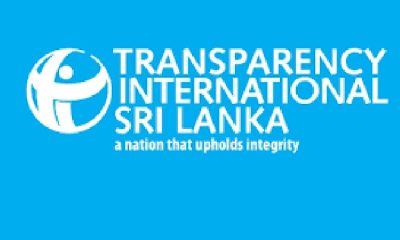
 News7 days ago
News7 days agoTISL, civil society flay NPP govt. for holding up Auditor General’s appointment
-

 Opinion7 days ago
Opinion7 days agoThe Maha Jana Handa at Nugegoda, cyclone destruction, and contenders positioning for power in post-NPP Sri Lanka – II
-

 Latest News7 days ago
Latest News7 days agoTannane goal from own half sets Morocco on way to FIFA Arab Cup 2025 title
-
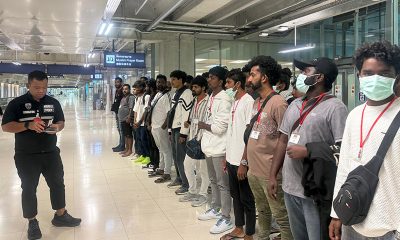
 News7 days ago
News7 days agoSri Lankans rescued from cybercrime centers in Myanmar repatriated



